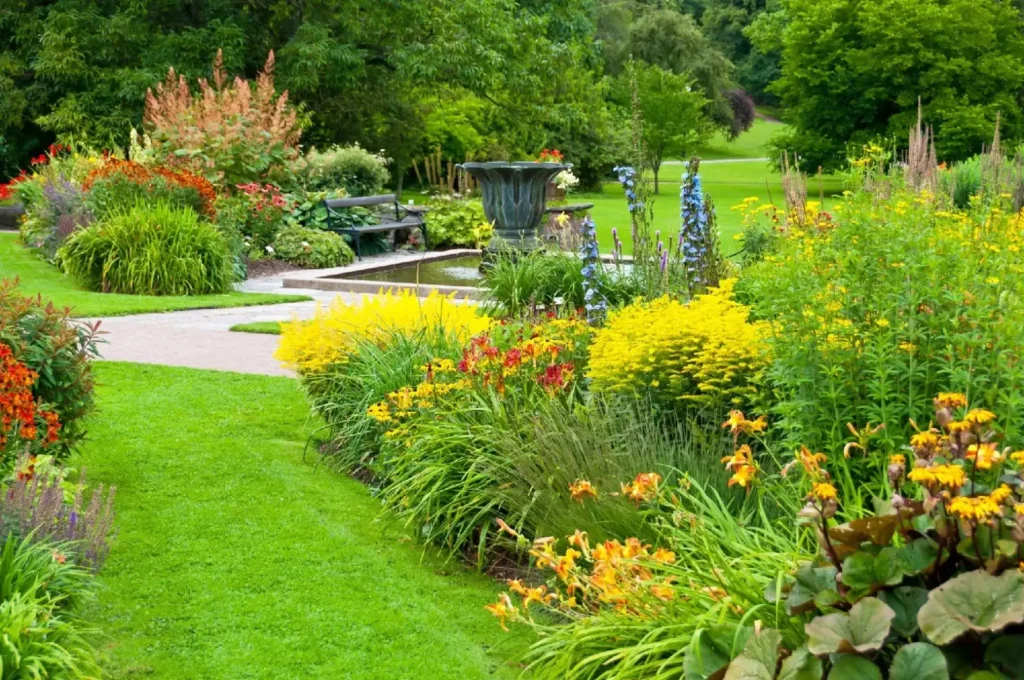Landscaping is an art that combines beauty, functionality, and sustainability. With the rise of smart farming and urban farming, it’s now easier than ever to create a stunning outdoor space that’s also eco-friendly.

In a world increasingly focused on sustainability, landscaping offers a unique opportunity to create stunning outdoor spaces that are both beautiful and eco-friendly. Here are some key principles to help you design a sustainable landscape that enhances your home and benefits the environment.
1. Choose Native Plants
Native plants are the backbone of sustainable landscaping. They require less water, fertiliser, and maintenance, making them ideal for your garden. They provide habitat for local wildlife and promote biodiversity.
2. Incorporate Edible Elements
Why not blend beauty with functionality? Consider integrating edible plants, such as herbs, vegetables, and fruit trees, into your landscape. This not only beautifies your space but also provides fresh produce right at your doorstep.
3. Utilise Smart Irrigation
Investing in a smart irrigation system can significantly reduce water waste. These systems adjust watering schedules based on weather conditions, ensuring your plants receive the right amount of moisture without excess. Traditionally, many landscapes rely on sprinkler systems that can waste a lot of water through evaporation, wind, or runoff. A more sustainable alternative is efficient irrigation systems like drip irrigation and soaker hoses.
4. Implement Hardscaping
Hardscaping elements like paths, patios, and retaining walls add structure to your landscape. Use sustainable materials such as reclaimed stone or permeable pavers to minimise environmental impact and enhance drainage.
5. Create a Wildlife Habitat
Incorporate features like birdhouses, pollinator gardens, and water sources to attract beneficial wildlife. These elements not only enhance the beauty of your landscape but also support ecosystems in your area.
6. Practice Organic Gardening
Reduce chemical usage by adopting organic gardening practices. Composting, mulching, and using natural pest control methods promote a healthier environment while keeping your garden thriving.
Benefits of Sustainable Landscaping

- Environmental Protection
- Water Conservation
- Soil Health Improvement
- Aesthetic Appeal
- Carbon Sequestration
- Cost Savings
- Health Benefits
Different types and designs

1. Native Plant Gardens
Utilising native plants is a cornerstone of sustainable landscaping. These plants require less water and maintenance, and they support local wildlife. Design your garden with clusters of native flowers, grasses, and shrubs to create a vibrant, low-maintenance landscape.
2. Edible Landscapes
Incorporating edible plants like fruits, vegetables, and herbs into your landscape can be both functional and attractive. Design raised beds, vertical gardens, or fruit trees that blend seamlessly with ornamental plants, making your garden productive and beautiful.
3. Rain Gardens
Rain gardens are designed to manage stormwater runoff and improve drainage. They feature native plants that thrive in wet conditions. Create a bowl-shaped garden that collects rainwater and filters it through layers of soil and plants, enhancing both function and aesthetics.
4. Xeriscaping
Xeriscaping is a water-efficient landscaping method that uses drought-tolerant plants and materials. Design your landscape with rock gardens, succulent displays, and gravel paths, minimising the need for irrigation while maintaining visual interest.
5. Permeable Hardscaping
Incorporate permeable materials in your hardscape designs to promote water infiltration. Use permeable pavers, gravel, or porous concrete for patios and walkways, allowing rainwater to soak into the ground and reducing runoff.
6. Vertical Gardens
Vertical gardening is an excellent way to maximise space, especially in urban settings. Use trellises, wall planters, or living walls to grow a variety of plants, enhancing both aesthetics and air quality.
Conclusion
Embracing sustainable landscaping beautifies our surroundings while delivering numerous environmental, economic, and social benefits. By prioritising eco-friendly practices, OrgaAyur productions encourage sustainable landscaping, create outdoor spaces that nurture both our communities and the planet. Start your journey toward a sustainable landscape today!
